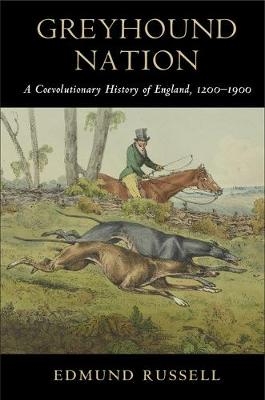
Greyhound Nation
A Coevolutionary History of England, 1200–1900
Seiten
2018
Cambridge University Press (Verlag)
978-0-521-76209-0 (ISBN)
Cambridge University Press (Verlag)
978-0-521-76209-0 (ISBN)
Edmund Russell's much-anticipated new book examines interactions between greyhounds and their owners in England from 1200 to 1900 to make a compelling case that history is an evolutionary process. Five forces - politics, economics, technology, ecology, and culture - consistently shaped greyhounds and their owners, with a radical transition in 1831.
Edmund Russell's much-anticipated new book examines interactions between greyhounds and their owners in England from 1200 to 1900 to make a compelling case that history is an evolutionary process. Challenging the popular notion that animal breeds remain uniform over time and space, Russell integrates history and biology to offer a fresh take on human-animal coevolution. Using greyhounds in England as a case study, Russell shows that greyhounds varied and changed just as much as their owners. Not only did they evolve in response to each other, but people and dogs both evolved in response to the forces of modernization, such as capitalism, democracy, and industry. History and evolution were not separate processes, each proceeding at its own rate according to its own rules, but instead were the same.
Edmund Russell's much-anticipated new book examines interactions between greyhounds and their owners in England from 1200 to 1900 to make a compelling case that history is an evolutionary process. Challenging the popular notion that animal breeds remain uniform over time and space, Russell integrates history and biology to offer a fresh take on human-animal coevolution. Using greyhounds in England as a case study, Russell shows that greyhounds varied and changed just as much as their owners. Not only did they evolve in response to each other, but people and dogs both evolved in response to the forces of modernization, such as capitalism, democracy, and industry. History and evolution were not separate processes, each proceeding at its own rate according to its own rules, but instead were the same.
Edmund Russell is Professor of History at Boston University, where he focuses his research on environmental history, the history of technology, US history, and biology. He is the author of Evolutionary History: Uniting History and Biology to Understand Life on Earth (Cambridge, 2011) and co-editor of the Cambridge Studies in Environment and History series.
1. Introduction; 2. Patrician coevolution (1200–1831); 3. Human evolution in a transitional era (1776–1831); 4. Greyhound evolution and coevolution in a transitional era (1776–1831); 5. Modernizing human evolution (1831–1900); 6. Modern coevolution for coursing (1831–1900); 7. Modern coevolution for shows (1860–1900); 8. Epilogue.
| Erscheinungsdatum | 16.04.2018 |
|---|---|
| Reihe/Serie | Studies in Environment and History |
| Zusatzinfo | 2 Tables, black and white; 17 Halftones, black and white; 2 Line drawings, black and white |
| Verlagsort | Cambridge |
| Sprache | englisch |
| Maße | 156 x 236 mm |
| Gewicht | 420 g |
| Themenwelt | Geisteswissenschaften ► Geschichte ► Regional- / Ländergeschichte |
| Geschichte ► Teilgebiete der Geschichte ► Kulturgeschichte | |
| Naturwissenschaften ► Biologie ► Ökologie / Naturschutz | |
| Sozialwissenschaften ► Soziologie | |
| ISBN-10 | 0-521-76209-X / 052176209X |
| ISBN-13 | 978-0-521-76209-0 / 9780521762090 |
| Zustand | Neuware |
| Haben Sie eine Frage zum Produkt? |
Mehr entdecken
aus dem Bereich
aus dem Bereich
der stille Abschied vom bäuerlichen Leben in Deutschland
Buch | Hardcover (2023)
C.H.Beck (Verlag)
CHF 32,15
vom Mittelalter bis zur Gegenwart
Buch | Softcover (2024)
C.H.Beck (Verlag)
CHF 16,80
Die Revolution des Gemeinen Mannes
Buch | Softcover (2024)
C.H.Beck (Verlag)
CHF 16,80


